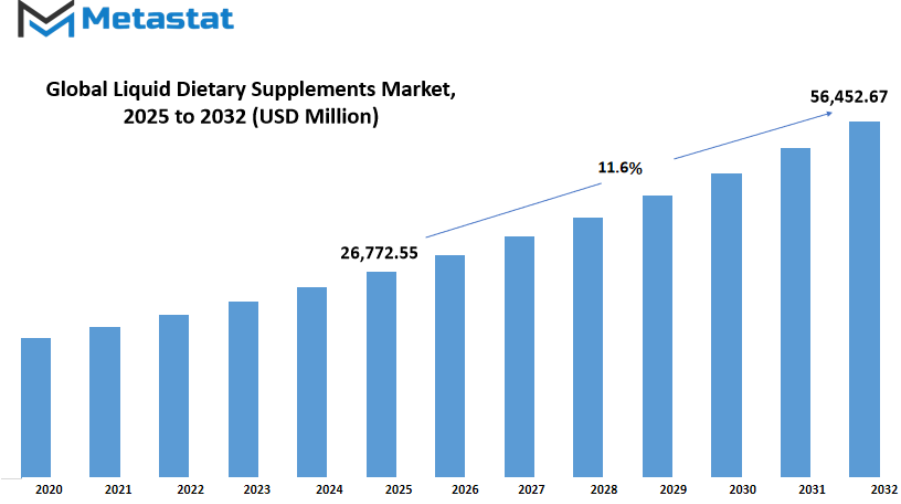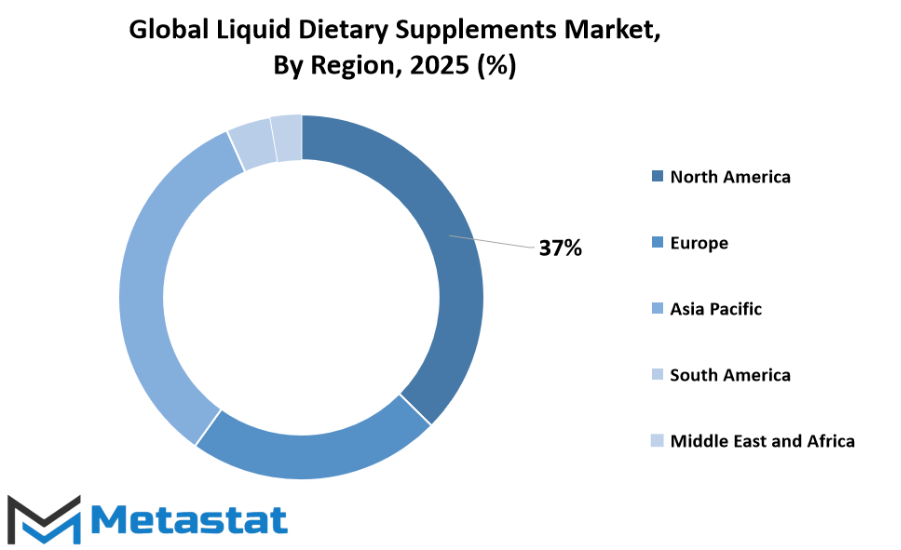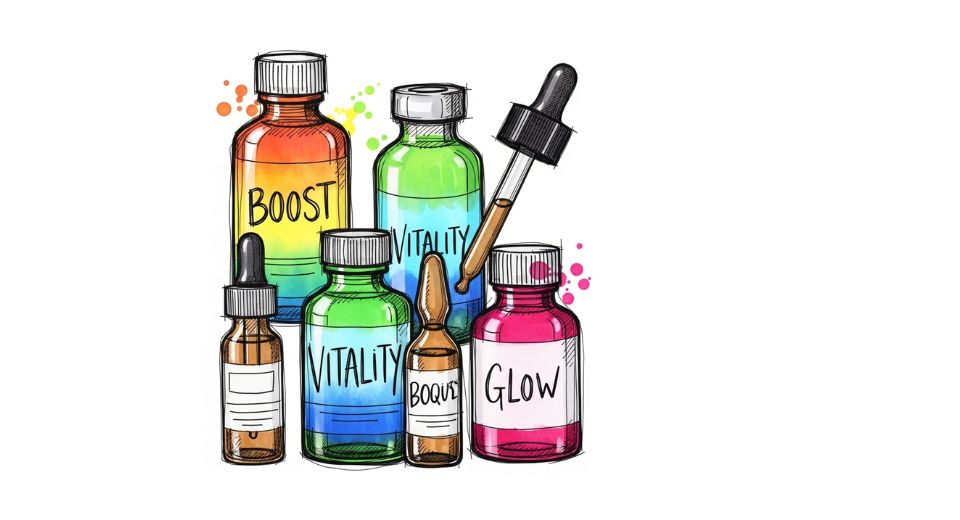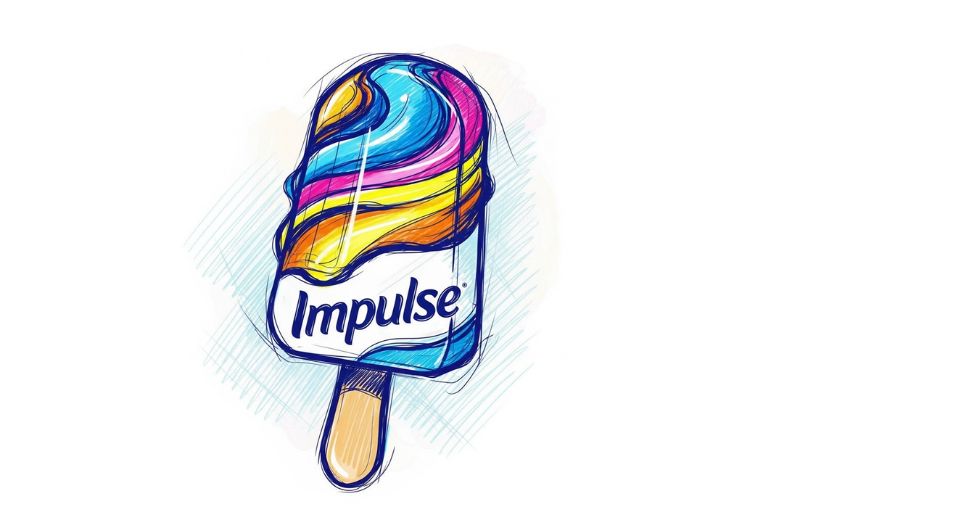MARKET OVERVIEW
The global liquid dietary supplements market will be a unique segment of the entire nutrition and health sector that is marked by the production and sales of consumable supplements in liquid form. As opposed to powders, tablets, or capsules, the supplements will be designed for direct ingestion so that they are simple to digest and rapid in absorption. The market will not be vitamin and mineral-based but will contain functional ingredients ranging from botanical extracts, proteins, amino acids, and other nutrients designed to foster wellness. What sets this market apart is its ability to deliver concentrated nutrition in convenient form pleasing a broad range of consumers from athletes searching for performance improvement to health maintenance advocates.
In the future, the market shall extend beyond traditional pharmacies and health stores because liquid nutritional supplements shall end up on different retail platforms like supermarkets, webstores, and specialist nutrition stores. The expanded distribution channel shall determine how customers interact with the product, creating a connection between manufacturers and end-consumers. It will also indicate greater use of individualized nutrition, whereby the consumer will choose a product that aligns with their specific health goals, age category, or lifestyle needs. The liquid delivery method will offer the possibility of even more innovative formulas that are not feasible with solid forms of supplements, which will give manufacturers a market advantage to create specialized solutions to wellness.
The global liquid dietary supplements market size will extend beyond product availability in the form of ready-to-drink nutrition shots or concentrate elixirs. It will encompass the vast ecosystem that facilitates product composition, such as ingredient sourcing, manufacturing processes, packaging technology, and quality testing standards. This transition will allow the market to evolve into a structured industry with equal emphasis on scientific validation and consumer trust. With regulatory mechanisms set to tighten in different countries, companies will have to prove transparency and safety, further strengthening the professional attitude of the sector.
Regional culture and tendencies will also influence the manner in which the global liquid dietary supplements market evolves. For instance, in some markets, consumers will look for plant-based and natural versions, whereas in others energy, immunity, or anti-aging fortified mixtures will be the center of attraction. Diversity of demand will force manufacturers to simplify their portfolios and concentrate their messaging so that they are addressing local expectations. This balancing act between global reach and local tailoring will keep the market from remaining stagnant but rather evolve into a varied industry with products for different segments of society.
Ultimately, the global liquid dietary supplements market will become more than just a supply chain for nutritional products. It will be a means to bridge between consumer convenience, health science, and evolving dietary habits. As a lean and flexible means of nutrient delivery, the industry will forge its own relevance in the greater scheme of health and nutrition.
Global liquid dietary supplements market is estimated to reach $56,452.67 Million by 2032; growing at a CAGR of 11.6% from 2025 to 2032.

GROWTH FACTORS
The global liquid dietary supplements market will continue to attract attention as consumers grow more aware of the connection between daily nutrition and long-term health. People are increasingly choosing products that support preventive healthcare, showing a shift toward maintaining wellness rather than waiting until problems arise. This awareness will keep driving demand for supplements that are easier to take and faster to absorb. Unlike tablets or capsules, liquid forms are viewed as more efficient since the body can process them more quickly, making them an appealing choice for many individuals who want reliable results with less effort.
The convenience of liquid dietary supplements is another reason behind their growing use. Busy lifestyles often limit the time people dedicate to preparing balanced meals, so having a supplement that can be consumed quickly without extra preparation adds value. This ease of use, paired with the perception of higher absorption, will continue to strengthen their role in daily nutrition. At the same time, the market faces notable challenges that will require careful solutions. The short shelf life of liquid formulations makes storage and distribution harder compared to other supplement formats. Retailers and manufacturers must address these issues to reduce waste and ensure consistent product availability.
Another barrier is the high manufacturing cost. The production of quality liquid dietary supplements demands advanced technology and careful ingredient handling, which makes them more expensive. For consumers who are sensitive to price, this can limit accessibility and slow down adoption, especially in regions where affordability strongly influences buying decisions. Still, these challenges do not overshadow the opportunities ahead.
One of the most promising growth drivers will be the increasing elderly population. As people age, they often prefer products that are easier to swallow and digest. Liquid supplements provide a practical solution to meet these needs, offering targeted nutrition that supports overall well-being in later years. This demographic shift will open strong opportunities for the global liquid dietary supplements market, especially when products are tailored to age-related requirements.
Looking ahead, advancements in preservation technology and more efficient production methods may reduce current limitations. By extending shelf life and lowering costs, manufacturers will be able to reach broader markets and improve affordability. Combined with rising health awareness and a stronger focus on preventive care, the global liquid dietary supplements market will likely see steady expansion. While challenges remain, innovation and changing consumer preferences will shape a future where liquid supplements hold a significant place in daily nutrition.
MARKET SEGMENTATION
By Type
The global liquid dietary supplements market is expected to experience significant growth as more people look for convenient and effective ways to support their health. With busy lifestyles and growing awareness about nutrition, individuals are turning to liquid supplements because they are easy to consume and often absorbed faster by the body compared to tablets or capsules. This trend is shaping the way companies design products, and it will continue to drive demand in the years ahead. As healthcare knowledge expands, the importance of preventive measures rather than only curative solutions is becoming clearer, which further supports the use of liquid dietary supplements.
Looking at the market by type, it is further segmented into over-the-counter (OTC) and prescribed supplements. OTC liquid supplements are more widely available and attract consumers who prefer to manage their wellness independently. They can be purchased at pharmacies, supermarkets, and even online platforms, giving buyers flexibility and control. Prescribed liquid supplements, on the other hand, are given under medical guidance. These are often targeted at individuals with specific health needs, such as deficiencies or medical conditions requiring professional supervision. This segmentation will continue to play a key role as it allows companies to serve both general consumers and patients with tailored products.
In the future, innovation will shape the global liquid dietary supplements market. Companies will likely focus on improving taste, packaging, and formulation to make supplements more appealing and user-friendly. There is also a growing interest in plant-based and natural ingredients, driven by consumers who want healthier options with fewer synthetic additives. As technology advances, we may see more personalized nutrition, where supplements are recommended based on an individual’s genetics, lifestyle, or health goals. This personalization will encourage both OTC and prescribed categories to expand in different directions, offering consumers products that feel specifically designed for them.
Global demand will also be influenced by changing demographics. Younger generations are showing more interest in fitness and wellness, while older populations are seeking solutions to maintain strength, energy, and immunity. Both groups will contribute to growth, but in different ways. While younger consumers may choose OTC options for daily energy or fitness recovery, older individuals may rely more on prescribed supplements to manage health conditions under professional advice.
Overall, the global liquid dietary supplements market will continue to evolve with innovation, consumer awareness, and medical advancements. The division between OTC and prescribed types ensures that products can meet a wide range of needs, from everyday wellness to specific medical concerns. This balance will be vital in shaping the market’s future direction and sustaining its growth.
By Ingredient Type
The global liquid dietary supplements market is expected to grow steadily as more people focus on their health and well-being. Consumers are becoming more aware of the importance of nutrition, and liquid forms of supplements are often seen as easier to consume and quicker to absorb than traditional tablets or capsules. This shift will influence how companies design and deliver their products in the coming years. With people of all ages looking for convenient ways to support their lifestyle, the market will continue to expand across different regions.
By ingredient type, the global liquid dietary supplements market is divided into several categories, each playing a unique role in human health. Vitamins will remain one of the strongest segments, as they are widely trusted and used to prevent deficiencies and support daily wellness. Botanicals are expected to attract growing interest because of the rising preference for natural ingredients. Minerals will continue to hold value as they are essential for bone strength, energy production, and overall health. Proteins and amino acids will see greater demand, especially among younger consumers and athletes who seek better recovery and muscle support. Fibers and specialty carbohydrates will likely grow as people look for digestive balance and weight management solutions. Omega fatty acids are set to gain more attention as awareness about heart and brain health rises. Probiotics, prebiotics, and postbiotics will strengthen their place in the market since gut health is increasingly recognized as key to immunity and overall wellness. Other unique formulations will also emerge as science develops new ways to meet specific health needs.
The future of the global liquid dietary supplements market will be shaped by innovation, technology, and personalized nutrition. Companies will likely use digital tools to help consumers select products that match their lifestyle, age, and health goals. Packaging will also change, with more eco-friendly options gaining importance. Online sales will expand further, making it easier for customers to access products worldwide. At the same time, strict quality control and transparent labeling will be necessary to build trust.
Overall, the global liquid dietary supplements market will play a central role in the health industry as people continue to look for simple, effective, and personalized solutions. The variety of ingredients ensures that the market will not be limited to one group of consumers but will meet the needs of different ages and lifestyles, creating opportunities for steady growth and wider acceptance in the future.
By Application
The global liquid dietary supplements market is expected to witness steady growth in the coming years as people around the world continue to show more interest in maintaining their health and well-being. The shift toward preventive healthcare will play an important role in shaping this industry. With more consumers realizing that lifestyle choices affect long-term health, liquid supplements are becoming a preferred option because they are easy to consume, quick to absorb, and often more convenient than capsules or tablets. This growing awareness will continue to fuel demand across different categories and applications.
By application, the global liquid dietary supplements market will expand into several segments that reflect the varied needs of consumers. The energy and weight management segment will likely see strong growth as more individuals seek products that support active lifestyles and effective weight control. Busy schedules and the popularity of fitness routines will continue to drive interest in these supplements. Bone and joint health will also remain a significant segment, particularly as aging populations in many regions seek solutions that help them maintain mobility and independence.
Cardiac health supplements will be another important area, especially with rising concerns over heart disease worldwide. The diabetes segment will also grow, as liquid supplements that help with blood sugar management become more widely recognized as a supportive option alongside medical treatment. Anti-cancer related supplements will likely attract attention in research and development, focusing on ingredients that support immune health and overall resilience.
In addition, supplements designed for skin, hair, and nails will remain popular, particularly among younger consumers who are focused on appearance and beauty. Anti-aging products will see consistent growth as well, with older populations turning to liquid supplements that promise vitality and healthier aging. Other categories will include general wellness, stress relief, and digestive health, which will further expand the choices available to consumers.
Looking ahead, the global liquid dietary supplements market will continue to be influenced by trends in personalization, natural ingredients, and technological advancements in formulation. Companies will likely invest in innovative flavors, improved bioavailability, and targeted blends that address multiple health concerns in a single product. E-commerce growth will also make these supplements more accessible to a global audience. With these developments, the market will not only expand in size but also in diversity, offering solutions tailored to the wide-ranging needs of consumers across all age groups.
By Distribution Channel
The global liquid dietary supplements market is gaining attention as more people look for convenient ways to support their health. Unlike traditional pills or capsules, liquid supplements are easier for the body to absorb, which makes them an attractive option for a wide range of consumers. This shift is not just a passing trend but a reflection of how health choices will evolve in the future. People are becoming more aware of what they consume, and the demand for effective, fast-acting solutions will continue to grow.
One of the key factors driving this growth is how these products reach customers. By distribution channel, the global liquid dietary supplements market is divided into hypermarkets and supermarkets, pharmacies, specialty stores, practitioners, others, and online platforms. Each channel has its own role in shaping consumer access and trust. Hypermarkets and supermarkets make supplements more visible to everyday shoppers, turning health into part of regular shopping routines. Pharmacies offer a trusted setting where people feel confident buying products that directly affect their well-being. Specialty stores bring a more personalized experience, often catering to those who are already invested in nutrition and wellness. Practitioners, such as doctors or nutrition experts, influence customers by recommending specific liquid supplements as part of treatment or lifestyle plans. The “others” category captures smaller outlets that still play a role in reaching local communities.
Perhaps the most significant transformation will come from online channels. As digital shopping continues to expand, the global liquid dietary supplements market will see remarkable opportunities. Online platforms provide convenience, a wide selection, and the ability to compare products instantly. Reviews, detailed information, and subscription models are changing how people decide what to buy. In the future, online sales will likely dominate, supported by advances in data-driven marketing and personalized recommendations. For many consumers, the process of choosing a liquid supplement will not involve walking into a store but browsing through options on a phone or computer, with delivery straight to their door.
Looking ahead, the growth of this market will not only depend on distribution but also on innovation in product formulation and packaging. As people expect supplements to fit seamlessly into busy lifestyles, companies will focus on creating products that are both effective and easy to use. With rising global interest in preventive health, the global liquid dietary supplements market will continue to expand, offering consumers more choice and accessibility than ever before.
|
Forecast Period |
2025-2032 |
|
Market Size in 2025 |
$26,772.55 million |
|
Market Size by 2032 |
$56,452.67 Million |
|
Growth Rate from 2025 to 2032 |
11.6% |
|
Base Year |
2024 |
|
Regions Covered |
North America, Europe, Asia-Pacific Green, South America, Middle East & Africa |
REGIONAL ANALYSIS
The global liquid dietary supplements market is expected to gain remarkable attention in the years ahead as consumer preferences shift toward health-focused solutions that are convenient and easy to use. More people are looking for products that will support their daily nutrition without disrupting their busy routines. Liquid supplements are often chosen because they are easier to absorb than traditional tablets or capsules, and this appeal will likely continue to drive demand across regions. With technology advancing and awareness of preventive healthcare growing, the market will not only expand in size but also evolve in the types of products offered.
When considering the market on a geographical basis, clear differences in demand and growth patterns become noticeable. North America is projected to hold a significant share due to strong consumer awareness and widespread adoption of wellness products. Within this region, the U.S. will remain the largest contributor, supported by established distribution channels and continuous innovation, while Canada and Mexico will also show steady growth. In Europe, countries such as the UK, Germany, France, and Italy are expected to drive expansion, with growing health-conscious populations seeking functional supplements that fit into modern lifestyles. The rest of Europe will also participate in this trend as awareness spreads.
Asia-Pacific is anticipated to be one of the most dynamic regions, with India, China, Japan, and South Korea leading the way. Rising incomes, growing urban populations, and an increasing focus on fitness and well-being will encourage more people in these nations to adopt liquid supplements. The rest of Asia-Pacific will likely follow this pattern as infrastructure and distribution improve. South America, led by Brazil and Argentina, will show promising growth as awareness of nutrition expands beyond urban centers, while the rest of the region gradually adopts similar habits. The Middle East & Africa will also become more important in the future, especially in GCC Countries, Egypt, and South Africa, where rising disposable incomes and changing lifestyles will push the demand for liquid dietary supplements.
Overall, the global liquid dietary supplements market is set for a future shaped by innovation, regional diversity, and growing consumer awareness. Each region will contribute differently, yet together they will create a landscape where liquid supplements become a more regular part of daily nutrition. This future will not only be about market size but also about how people worldwide begin to view health in a more proactive and convenient way.

COMPETITIVE PLAYERS
The global liquid dietary supplements market is gaining attention as consumers continue to look for convenient ways to support their health. People today are more conscious of their nutrition, and the demand for supplements that are easy to take and quick to absorb will keep growing. Unlike traditional tablets or capsules, liquid options often provide faster absorption, which appeals to individuals who want effective results without difficulty. This steady preference for liquids will encourage more companies to expand their offerings and focus on innovation in flavors, ingredients, and packaging.
The competitive players in this industry are shaping how the market will evolve. Companies such as Abbott Laboratories Inc., Amway Corporation, DSM Nutritional Products AG, DuoLife S.A., Glanbia plc, Herbalife Nutrition, Liquid Health Inc., Nature’s Bounty Inc., Nestle Health Science, Haleon Group, and Unilever are already setting standards with their research, marketing strength, and global presence. Each of these organizations brings its own strategies to reach consumers. Some concentrate on scientific credibility and clinical studies, while others focus on branding, lifestyle marketing, and direct selling. This mix of approaches will make the market more dynamic and competitive in the coming years.
Innovation will be the main driver of growth. For instance, companies are likely to experiment with plant-based ingredients, personalized formulas, and sustainable packaging. As awareness about natural and organic products increases, the leading brands will compete to create supplements that match consumer expectations for health and environmental responsibility. Technology will also play an important role, with digital platforms and mobile apps helping people track their nutritional intake and select products that fit their personal health goals.
Another important aspect is the global reach of these players. Multinational corporations such as Nestle Health Science and Unilever will continue to benefit from their established supply chains and distribution networks. At the same time, smaller specialized companies like Liquid Health Inc. and DuoLife S.A. will find opportunities by targeting niche markets and offering unique formulations. This balance between global giants and innovative mid-sized firms will give consumers a wide variety of choices, pushing competition further.
Looking ahead, the global liquid dietary supplements market will not only expand in size but also in diversity. With strong competition, advancing technology, and changing consumer habits, the future will bring more personalized, accessible, and innovative supplement options. The companies that can adapt quickly, invest in research, and understand consumer needs will be the ones leading the market.
Liquid Dietary Supplements Market Key Segments:
By Type
- OTC
- Prescribed
By Ingredient Type
- Vitamins
- Botanicals
- Minerals
- Proteins & Amino Acids
- Fibers & Specialty Carbohydrates
- Omega Fatty Acids
- Probiotics
- Prebiotics & Postbiotics
- Others
By Application
- Energy & Weight Management
- Bone & Joint Health
- Cardiac Health
- Diabetes
- Anti-cancer
- Skin/Hair/Nails
- Anti-aging
- Others
By Distribution Channel
- Hypermarkets/Supermarkets
- Pharmacies
- Specialty Stores
- Practitioner
- Others
- Online
Key Global Liquid Dietary Supplements Industry Players
- Abbott Laboratories Inc.
- Amway Corporation
- DSM Nutritional Products AG
- DuoLife S.A.
- Glanbia plc
- Herbalife Nutrition
- Liquid Health Inc.
- Nature’s Bounty Inc.
- Nestle Health Science
- Haleon Group
- Unilever
WHAT REPORT PROVIDES
- Full in-depth analysis of the parent Industry
- Important changes in market and its dynamics
- Segmentation details of the market
- Former, on-going, and projected market analysis in terms of volume and value
- Assessment of niche industry developments
- Market share analysis
- Key strategies of major players
- Emerging segments and regional growth potential








 US: +1 3023308252
US: +1 3023308252






